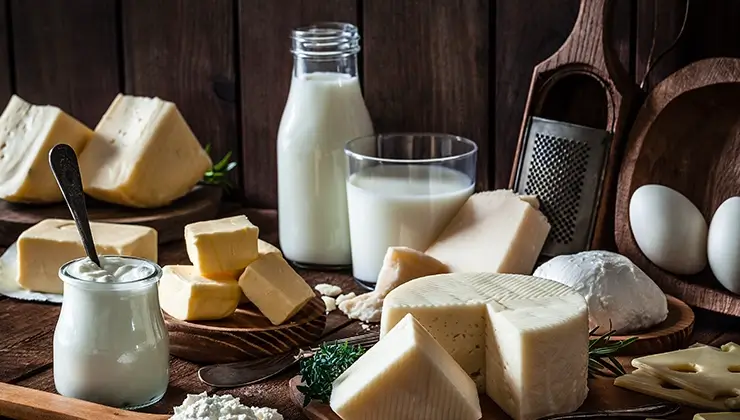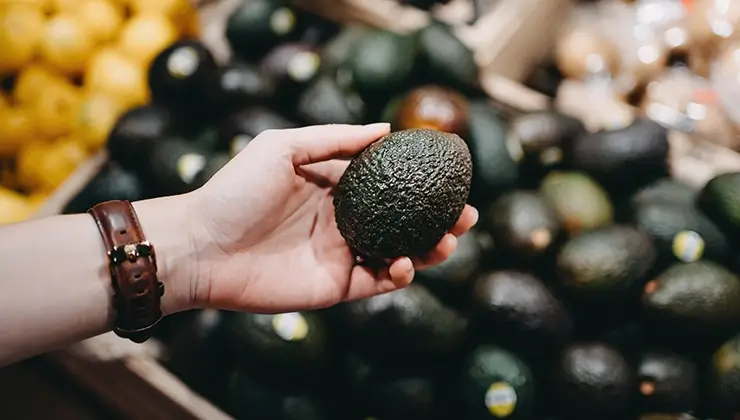9 Foods That Naturally Boost Serotonin
Fast Facts
- Sorotonin is a feel-good hormone produced naturally in the body, with the highest levels in our gastrointestinal tract
- Low levels of serotonin are linked to fatigue, sadness, and depression, while heightened levels contribute to an uptick in energy and mood
- Serotonin is made when tryptophan (an essential amino acid) is digested, so foods high in tryptophan may help to raise serotonin levels in the body
Serotonin is best known for being one of our four feel-good hormones, or happiness hormones produced naturally in the body. But it’s also a major player in anti-anxiety and antidepressant drugs worldwide—a $15 million market expected to hit $20 million by 2030.
Low levels of serotonin are known to contribute to feelings of fatigue, sadness, and depression but when levels are well-balanced, our energy and mood—and countless other bodily functions—hum along happily.
Luckily, popping a pill is not the only way to boost this all-important neurotransmitter—there are natural ways to help your body make more, such as eating a serotonin-boosting diet. Here’s a primer on how serotonin works and how you can raise levels with food, for happier days ahead.
What Is Serotonin?
Serotonin is a monoamine neurotransmitter, a chemical messenger that relays signals to nerve cells used by the central nervous system (CNS) and other parts of the brain. Surprisingly, the highest concentration of serotonin—95 percent—is produced in our gastrointestinal tract (1).
Serotonin is made by tryptophan, an essential amino acid (2) and building block of protein that we can only get from food. During digestion (3), tryptophan is converted into 5-Hydroxytryptophan (5-HTP) and then converted once more into 5-hydroxytryptamine (5-HT), better known as serotonin, which operates like a hormone in the body, supporting a plethora of our bodily functions.
What Does Serotonin Do?
You know it best for being associated with happiness—or sadness and depression when it’s in short supply. In addition to mood support, serotonin plays a key role in memory, learning, sleep, appetite, cardiovascular health, temperature control, digestion, bladder control, and more (4,5).
Because of its prominent job in helping to regulate happiness and mood, it’s also the main target of pharmaceutical treatments for anti-anxiety and antidepressant drugs such as selective serotonin reuptake inhibitors (SSRIs) and serotonin and norepinephrine reuptake inhibitors (SNRIs), both of which stop serotonin from being reabsorbed once it’s been used, keeping it around longer to maintain feelings of well-being (6).
How to Naturally Raise Serotonin Levels
Medication isn’t the only way to boost serotonin levels. You can give your levels a natural uptick with a few key lifestyle changes.
Exercise
Working out is a great way to increase serotonin (7)—just consider the term “runner’s high.” After cardiovascular exercise like running, cycling, or resistance training, more serotonin-producing tryptophan is released into the blood (8).
Vitamin D
Getting more sunlight is another way to promote serotonin production. When bright light hits the retina of our eyes and our skin—whether from UV rays or a light-therapy light—our bodies produce more serotonin (9). Inversely, a lack of light is associated with a drop in serotonin (10), which is often referred to as seasonal affective disorder, or SAD.
Diet
And finally, because you can only get serotonin-producing tryptophan through your diet, food is another natural way to induce more feel-good vibes (11). As you may know, turkey is one well-known source of tryptophan, but it’s also found in other high-protein foods—and a few surprising ones, too.
It’s important to note that tryptophan on its own doesn’t do a great job of getting through the blood-brain barrier, which is required for making serotonin. Because of this, it’s recommended (7) to eat tryptophan-rich foods with complex carbohydrates. Carbohydrates signal the body to release insulin, which helps the body absorb more amino acids, therefore ushering more of the tryptophan you eat across the blood-brain barrier to make more serotonin.
Complex carbs to pair with your serotonin-boosting fare are oats, brown rice, whole-grain bread and pasta, quinoa, and millet, to name a few.
9 Natural Serotonin-Boosting Foods

1. Salmon and Tuna
Tryptophan production is another reason to prioritize two servings of fish per week. Cooked bluefin tuna and sockeye salmon both contain approximately 570mg per 3.5-ounce serving, meaning you’re getting 203 percent of your recommended daily intake (RDI) when you opt for salmon or tuna.
2. Poultry
Every year at Thanksgiving there’s that one relative with the tryptophan “newsflash,” but turkey isn’t the only poultry source of the hormone—everyday chicken contains more. In a 100-gram (3.5-ounce) serving of roasted white chicken meat, you get 444mg (159% RDI) and 545mg (195% RDI) if you choose dark chicken meat. As for turkey, the light meat contains 273mg (97% RDI), with dark thigh meat slightly behind at 251mg (90% RDI).
3. Lamb and Pork
Topping the list of animal meats is lamb shoulder with a whopping 706mg (252% RDI) per 3.5 ounces. Pork chops aren’t far behind with an impressive 651mg, checking off 232 percent of your daily need.

4. Milk and Cheese
Dairy products like milk and cheese are a good source of tryptophan with plenty of options to choose from. Some of the best sources are full-fat milk with 224mg (80% RDI) in a 16-ounce serving and skim milk with 211mg (75% RDI). As for cheese, cottage and ricotta both deliver approximately 160mg (56% RDI) per half-cup, while mozzarella and cheddar each contain 155mg (56% RDI).
5. Sweet Potatoes and Spinach
There aren’t too many high-ranking tryptophan veggies on the list. But everyone’s favorite, sweet potatoes, contributes a good amount at 92mg (33% RDI) in one steamed, mashed cup. A close contender is spinach with 72mg (26% RDI).
6. Seeds and nuts
In the nuts and seeds world, seeds reign supreme with dried pumpkin and squash seeds on top with 164mg (58% RDI) of tryptophan in a single ounce. Chia, hemp, sunflower, and sesame seeds all pack about 100mg per ounce. For nuts, walnuts take the tryptophan trophy at 90mg (32% RDI) followed by cashews with 82mg.

7. Avocados
Florida avocados have a slight leg up on those from California with 64mg of tryptophan per 1-cup serving compared to west-coast avo’s 58mg. Either way, both work out to be approximately 20 percent of your RDI, so you can’t go wrong.
8. Eggs
One whole egg (white and yolk) contains 85mg (31% RDI). When you scramble up two or three, you’re on your way to getting the daily recommendation before even starting your day.
9. Soy
If you spot edamame as a salad- or bowl-topper option on a menu, pile it on for a mood boost. One cup of soybeans (edamame) packs 416mg of tryptophan (149% RDI). Tofu, a soybean product, offers 592mg (212% RDI) per cup, while tempeh packs 322mg (115% RDI) per cup.
What Foods Deplete Serotonin?
As mentioned above, a low-protein or low-carb diet may play a role in lower serotonin levels since both are required to get, and adequately absorb, tryptophan for serotonin production.
Other dietary choices that might deplete serotonin levels include caffeine consumption (12), and inflammatory foods that can potentially disrupt the microbiome—which holds 95 percent of the body’s serotonin—depleting the gut of the good bacteria it needs to optimally produce those happy neurotransmitters (13).
On the inflammatory foods list is highly-processed foods (14) such as fast foods, sugary foods and sodas, additives, and food coloring. Drinking alcohol may also lower serotonin (15). Research has shown that alcoholics produce and break down serotonin more slowly than people who don’t imbibe.
The Bottom Line
Between prioritizing a few lifestyle choices and eating a range of tryptophan-rich foods, you can help boost serotonin levels naturally. You don’t have to be a big meat eater either—our list of serotonin-boosting foods contains a wide range of options that appeal to plant-forward eaters and carnivores alike. So dig in, enjoy, and you’ll be well on your way to happier, serotonin-spiked, days.
References
Terry, Natalie, et al. (2017). “Serotonergic Mechanisms Regulating the GI Tract: Experimental Evidence and Therapeutic Relevance.”
“Tryptophan” Medline Plus
Mora-Villalobos, José-Aníbal et al. (2018) “Synthetic Pathways and Processes for Effective Production of 5-Hydroxytryptophan and Serotonin from Glucose in Escherichia Coli”
Bakshi A, Tadi P. (2021) Biochemistry, Serotonin.
Berger, Miles et al. (2018) “The expanded biology of serotonin.”
Yu, Zhenwei. (2020) “Trends in Antidepressant Use and Expenditure in Six Major Cities in China From 2013 to 2018.”
Watson, Stephanie. (2021) “Serotonin: The Natural Mood Booster.”
Martin, Kyle S. et al. (2021) “The kynurenine connection: how exercise shifts muscle tryptophan metabolism and affects energy homeostasis, the immune system, and the brain.”
Sansone, Randy A, et al. (2013) “Sunshine, serotonin, and skin: a partial explanation for seasonal patterns in psychopathology?.”
Mayo Clinic. (2021) “Seasonal Affective Disorder (SAD) – Symptoms and Causes.”
Strasser, Barbara et al. (2016) “Mood, food, and cognition; role of tryptophan and serotonin.”
Lee, Jeong-Beom, et al. (2019) “Ingestion of caffeine links dopamine and 5-hydroxytryptamine release during half immersion in 42°C hot water in a humans.”
Carpenter, Siri. (2012) “That Gut Feeling.”
Naidoo, Uma. (2019) “Gut feelings: How food affects your mood.”
Clinical Trials. (2008) “NCBI – WWW Error Blocked Diagnostic.”














